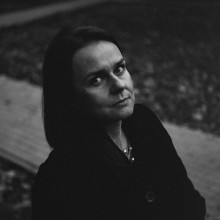Polish literature

Julia Fiedorczuk
Julia Fiedorczuk (b. 1975) is a poet and fiction writer. Her other occupations include literary translations, criticism and research. She is a professor and academic teacher at the Institute of English Studies, University of Warsaw. She is a co-founder of the School of Ecopoetics at the Polish School of Reportage.
Fiedorczuk’s writing is a vehicle for an essentially non-anthropocentric vision of the world. Manifest in it is also the author’s affinity with ecofeminism, complemented with a postmodern version of Romantic philosophy, present since the publication of the collection Oxygen [Tlen] onwards. In November by the Narew [Listopad nad Narwią] Fiedorczuk offers a vision of the world dominated by fish imagery (the fish embody an intuitive, thoughtless sort of wisdom) and the tropes of journey, longing and of bonding not only with the loved one, but all living creatures. In her subsequent books the poet enlarges the scope of her vision, initially limited to the Earthly scale, and goes on to evoke spacescapes and parallel worlds seen as macro- and microcosms. In Oxygen the reader comes across “the world’s enormous soul,” luminous explosions, gigantic organs of the universe on the one hand, and compost-dwelling microorganisms, neutrinos and life-distributing haemoglobin on the other. In Psalms [Psalmy] the author makes her case for the socially excluded people as well as for plants, animals and landscapes. Her poems mourn for those who have perished in the recent events of the creeping global war, but also for the irretrievably vanished species and ecosystems.
Fiedorczuk’s poetry contributes to the discussion on the mutual relations between art and science (technology), new sensitivity and sensuality under post-technology conditions. Her interests include also the faculties of human body and soul as seen from different perspectives and times. Her work espouses the artistic philosophy developed by Bolesław Leśmian and later continued by Miron Białoszewski and Krystyna Miłobędzka: artists who never ceased to point to the blurry nature of the boundary between the human and non-human. Like them, Fiedorczuk can be considered a poet who invents a new sensibility for a post-human world.
In her short story collection Maria’s Morning [Poranek Marii] and her novel White Ophelia [Biała Ofelia] Fiedorczuk addresses the female experience through portrayals which, grounded as they are in social and political contexts, can also be read as metaphors for otherness, strangeness. With her dreamlike imaginative verse and with her sensual and vivid language, Fiedorczuk suggests that a protagonist who empathizes with all that lives may well be qualified to disprove prejudices prevailing in a society, and to offer a critical view on human communities.
In Under the Sun [Pod słońcem] Fiedorczuk offers an extremely evocative and original portrayal of the people inhabiting the multicultural, multilingual and vastly contradictory region of Podlasie. In The House of Orion [Dom Oriona] the novel’s constellatory structure takes to places far apart: to the Białowieża Forest, to the agitated streets of Athens, to a rainforest in central Mexico. One follows the intriguing and mysterious entanglements that bind together humans, animals, minerals and stars. The author’s recent book, Glyph [Glif] is not merely a collection of poems, but a philosophical treatise on time, identity and interaction.
For her debut volume of poetry, November by the Narew (2000), she received the prize of Polish Association of Publishers. Her novel Weightlessness [Nieważkość] was longlisted for the Nike Literary Award. She was the laureate of the Wisława Szymborska Award for Psalms, which was also nominated for the Siesius Poetry Award in 2018 in the category Book of the Year. In 2020 she was nominated for the Julian Tuwim Literary Award. In 2021 she was nominated for the City of Warsaw Literary Award for the novel Under the Sun.
BIBLIOGRAPHY
POETRY:
- Listopad nad Narwią, Biuro Literackie Port Legnica, 2000
- Bio, Biuro Literackie, 2004
- Planeta rzeczy zagubionych, Biuro Literackie, 2006
- Tlen, Biuro Literackie, 2009
- tuż-tuż, Biuro Literackie, 2012
- Psalmy, Fundacja na rzecz Kultury i Edukacji im. Tymoteusza Karpowicza, 2017
- Astrostrada z girlandami. Wiersze zebrane, Wydawnictwo Warstwy, 2023
- Glif, Wydawnictwo Warstwy, Wrocław, 2024
FICTION:
- Poranek Marii i inne opowiadania, Biuro Literackie, 2010
- Biała Ofelia, Biuro Literackie, 2011
- Nieważkość, Marginesy, 2015
- Bliskie kraje, Marginesy, 2016
- Każdy śnił swój sen, Fundacja Nowoczesna Polska, 2019
- Pod słońcem, Wydawnictwo Literackie, 2020
- Dom Oriona, Wydawnictwo Literackie, 2023
SEECTED ESSAYS AND RESEARCH PUBLICATIONS:
- Złożoność nie jest zbrodnią. Szkice o amerykańskiej poezji modernistycznej i postmodernistycznej, Wydawnictwo Uniwersytetu Warszawskiego, 2015
- Inne możliwości, Wydawnictwo Naukowe Katedra, 2019
TRANSLATIONS FROM OTHER LANGUAGES INTO POLISH:
- Laura Riding Jackson, Korona dla Hansa Andersena. Utwory wybrane: opowiadania, Biuro Literackie, 2012
- Laura Riding Jackson, Obroty cudów. Utwory wybrane: wiersze i eseje, Biuro Literackie, 2012
- Laurie Anderson, Język przyszłości, Biuro Literackie, Wrocław 2012
- Forrest Gander, Bądź blisko, Lokator, 2020
- Forrest Gander, Podwojone życie. Ekologia bliskości, Wydawnictwo Ossolineum, 2023
TRANSLATIONS TO OTHER LANGUAGES
English:
- Oxygen [wybór wierszy], transl. Bill Johnston, Brookline, MA: Zephyr Press, 2017
- Psalms [Psalmy], transl. Bill Johnston, Madison: University of Wisconsin Press, 2023
Chinese:
- Lie hu bi = Orion's shoulder, Sha Tin, N.T., Hong Kong : The Chinese University Press, 2017
Lithuanian:
- Po saule: romanas [Pod słońcem], transl. Kazys Uscila, Wilno: Vaga, 2022
Spanish:
- Oxígeno [wybór wierszy], transl. Gerardo Beltrán, Meksyk : Granises, Servicios de Edición y Comunicación La Otra, 2017
Serbian:
- Grafikon [wybór wierszy], transl. Milica Markić, Novi Pazar: Građanski forum, 2019
- Pod suncem [Pod słońcem], transl. Milica Markić, Belgrad: Službeni glasnik, 2023
Swedish:
- Syre [wybór wierszy], transl. Irena Grönberg, Sztokholm: Bokförlaget Lejd, 2017
Ukrainian:
- Недалекі краї [Bliskie kraje], transl. Vikrot Dmytruk, Storozhynets: V. Books XXI, 2019